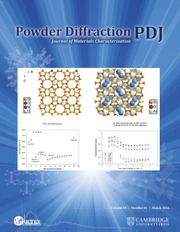Article contents
XRD profile modeling approach tools to investigate the effect of charge location on hydration behavior in the case of metal exchanged smectite
Published online by Cambridge University Press: 14 November 2013
Abstract
This work aims to investigate the hydration behavior and structural properties of two dioctahedral smectites with contrasting location charge (beidellite SbId-1 and montmorillonite SWy-2) according to the nature of the bivalent compensator heavy metal cations (i.e. Hg (II), Ni (II), Ba (II) and Mg (II)). This study is achieved using XRD profile modeling approach based on the simulation of the 00l reflection which allowed us to determine structural characteristics along the c* axis related to the nature, abundance, size, position and organization of exchangeable cation and water molecule in the interlamellar space along the c* axis. The obtained results show that a heterogeneous hydration behavior is systematically observed in all studied samples and the structural models, used to fit samples with tetrahedral charge, are more heterogeneous than smectite with an octahedral sheets substitution. In the case of exchanged beidellite specimen, the proposed models are described by a mixed layer structure with variable abundance containing respectively, dehydrated (0W), mono-hydrated (1W) and bihydrated (2W) layers. Whereas, in the case of the montmorillonite, the absence of 0W hydration state is noted.
- Type
- Technical Articles
- Information
- Copyright
- Copyright © International Centre for Diffraction Data 2013
References
- 8
- Cited by


